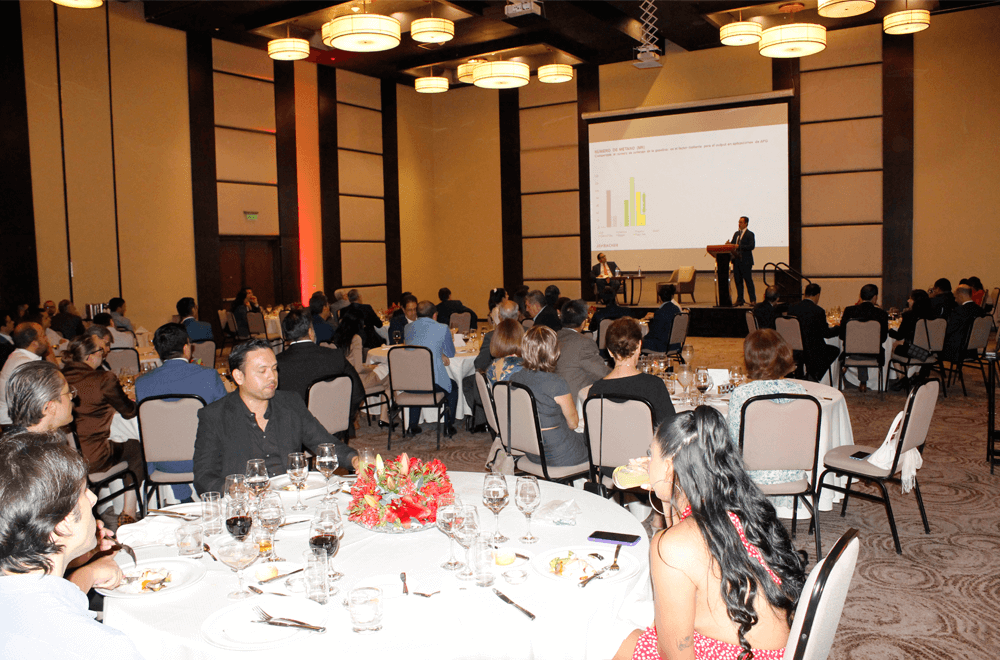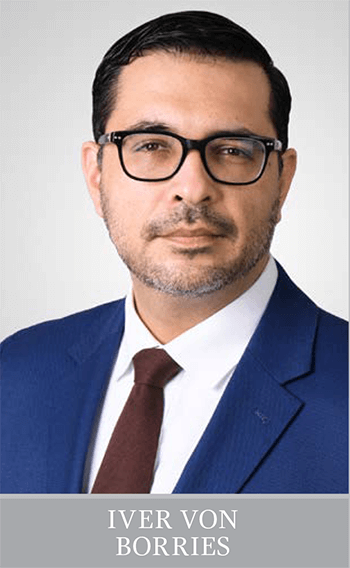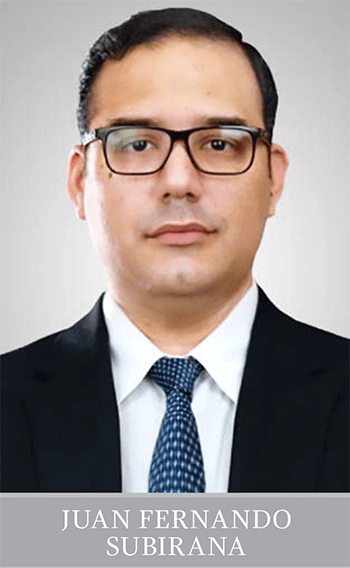
Proposed Generation of CRYPTOASSETS IN MATURE OIL WELLS in Bolivia
Producing digital goods in Bolivia by generating electricity from mature oil wells and demanding their regulation was one of the disruptive proposals at CAEE 2024.
ISSUE 130 | 2024
Vesna Marinkovic U.
Proposing the production of digital goods, better known as crypto assets, in mature oil wells and plants that process gas from still-productive wells in Bolivia was one of the proposals that garnered the most attention during an evening of interesting initiatives for the hydrocarbons sector, at the fourth Annual Energy Dinner (CAEE) 2024.
Andre Balzi, Sales Manager for South America at INNIO-Jenbacher, Brazil, specifically proposed using flare gas in electricity production to generate digital goods, taking advantage of the waste from this hydrocarbon, simultaneously supporting the generation of foreign currency and employment sources.
He stated that the gas burned in a flare, currently without any benefit, could translate to approximately $5 per thousand cubic feet of gas (Mcf) in returns from crypto asset production, adding that this could become an annual profit of around $250,000, depending on the gas volume.

"It was indeed a night capable of inspiring significant ideas for the energy sector in Bolivia and the region…"
According to Balzi, these figures can vary depending on the fluctuation of cryptocurrency prices. He indicated that, on average, this annual profit allows for the recovery of an initial half-million-dollar investment in generation equipment and Bitcoin mining computers within two years, and that from the third year onward, the project starts generating net profit.

“I thank ENERGÍABolivia magazine for this space and for considering important topics for the energy agenda. The topic of crypto assets is extremely innovative and highly complex, depending on the perspective from which it is analyzed. It is true that it is a mistake to demonize them since they are neutral; like many things in life, they are neither inherently good nor bad, but rather depend on how they are used.
A proper use of a crypto asset is that it is decentralized from the global banking system; it does not depend on any Central Bank, which is its main characteristic, and it has an undeniable traceability feature that makes it highly attractive to all countries.
Something that I believe should be mentioned with a certain degree of embarrassment is the veto placed by the Central Bank of Bolivia on cryptos. However, it is true that there is fear that, since they do not depend on any banking system, they could be used as a currency for illicit money, resulting from drug trafficking or other illegal activities. Nonetheless, it is clear that countries like Switzerland and Japan already have regulations in this regard and have started to regulate their operation."
Iver von Borries was the moderator for the topic “Is it enough to enact laws favorable to the use of cryptocurrencies, but not activate projects that boost these measures in the short, medium, and long term?” assigned to Deputy Mariela Baldivieso.

"It has been an incredibly enriching evening from the opening remarks of Alejandro Durán, President of the CRE RL Board of Directors, who highlighted the need to open up the energy sector in forums in terms of education, training, and knowledge, which we have successfully achieved by the end of this night.
Durán emphasized the importance of having a new business model both for the production of green hydrogen to replace natural gas and for the operation of digital assets through electricity generation (in remote areas to utilize gas reserves) in mature wells, mitigation of flares in active fields, and the development of off-grid renewable energy projects (solar, wind, hydro, and biomass).
He presented key ideas on the fundamental principles for the energy business: to be sustainable, profitable, and to maintain the vision of progress for the people who ultimately receive this valuable resource, which is energy. He stressed that learning about energy issues must be ongoing to achieve levels of energy efficiency and development.
It was truly a night capable of inspiring important ideas for the energy sector in Bolivia and the region." Juan Fernando Subirana acted as the moderator for three presentations and concluded the night with important takeaways.
"Using flare gas to mine Bitcoin is a good alternative, even favorable to the environment," Balzi said when discussing Bitcoin mining from the residue generated by oil wells. "That gas being wasted into the atmosphere at mature oil wells and processing plants can well be used to convert into electrical energy and be utilized for mining crypto assets," he noted.
Indeed, using flare gas to produce electricity, reducing 98% of the emissions emitted by the hydrocarbons industry, is another virtue of this technique, which is being used in several countries in the region like Argentina, which is already producing electricity with gas from Vaca Muerta for digital goods production.
As an additional point, it is known that the climate impact of burning associated gases is equivalent to the annual emissions of 77 million cars. If these were converted into carbon credits at $75 per metric ton, the emissions would be worth $30 billion.
Balzi presented on “What to Do to Harness the Remaining Gas Reserves in Inactive Oil Wells, Along with Flare Gases in Active Wells, for Electricity Generation and the Production of Digital Goods,” to an audience filled with national and international energy sector actors.
TO DIVERSIFY THE ECONOMY
Mariela Baldivieso, a deputy from Comunidad Ciudadana, complemented this stance by stating, “In the context of an increasingly digitalized world, crypto-asset mining emerges as a promising opportunity for Bolivia's energy sector. This phenomenon, driven by the growing demand for cryptocurrencies like Bitcoin and Ethereum, offers an innovative way to optimize and monetize our energy resources.”
“Bolivia has a significant energy generation capacity, especially through renewable sources like hydroelectric power. Crypto-asset mining can leverage this excess energy capacity to generate additional income and improve the operational efficiency of our facilities,” she said, complementing Balzi's position on utilizing the remaining gas reserves in inactive oil wells.
She stated that one of the main benefits of crypto-asset mining is its capacity to diversify the country's economy. By using energy sources for digital mining activities, a new source of income can be established that not only complements but also strengthens the traditional economy.
“In conclusion, crypto-asset mining represents a strategic opportunity for Bolivia's energy sector. By capitalizing on our energy resources through digital mining, we can move towards a more diversified, innovative, and competitive economy in the global context,” the deputy emphasized.
ABOUT THE MATURE OIL WELLS IN BOLIVIA
José Luis Molina, former Senior Engineer of Well Testing and Completions at Repsol-Bolivia, began his presentation by explaining that mature fields are those in the last stage of their productive development and can be either oil or gas fields, whether active or temporarily closed.
He mentioned that Yacimientos Petrolíferos Fiscales Bolivianos (YPFB), with the goal of gradually reducing fuel imports, has conducted studies on opportunities for the reactivation of mature or closed fields, identifying 8 regions in the country with 40 wells with significant potential.
Complementing Balzi and Baldivieso’s proposals with technical expertise, he said that as the individual production data of the proven fields becomes known, a projection of the volumes to be produced over time should be constructed, to then consider the possibility of generating derived energy in these fields. Molina covered the topic: “Situation of Mature Oil Wells in Bolivia and Perspectives.”
The Annual Energy Dinner (CAEE) 2024, held in Santa Cruz de la Sierra, Bolivia, had as its central theme the production of digital goods from electricity generation in mature oil wells, and renewable energies as a disruptive alternative, representing an opportunity to generate foreign exchange and employment in the country.

“…mature fields are those in the last stage of their productive development and can be either oil or gas fields…”











